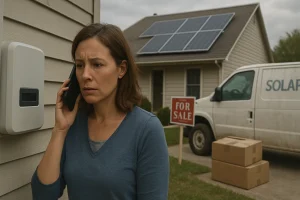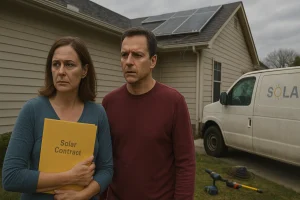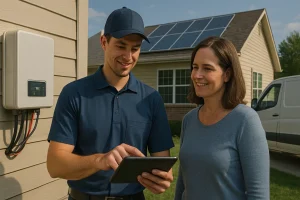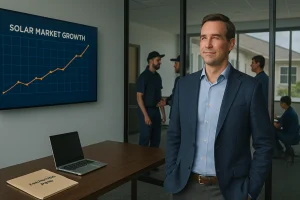Will Solar Installers Goes Out of Business: What Happens Next?

What Happens When Your Solar Installer Goes Out Of Business?
When a solar installer goes out of business, it creates immediate concerns about customer warranties, unfinished projects, and financial obligations. The solar industry has seen over 100 companies close in 2024-2025, leaving thousands of homeowners wondering about their solar investments. Understanding what happens during these closures and how to protect your business and customers is crucial for success in today’s competitive solar market.
Why Are Solar Companies Going Out of Business?
Solar installers go out of business for various reasons. Understanding these factors helps companies prepare and protect themselves from similar fates.

Interest Rate Impact on Solar Sales
Rising Federal Reserve rates made solar loans expensive for homeowners. Systems costing $200 monthly to finance jumped to $300 or more, scaring away potential customers and causing dramatic sales drops for installers relying on financed sales.
Policy Changes Hit Hard
California’s switch from NEM 2.0 to NEM 3.0 cut homeowner compensation for excess solar power by up to 75%. This single policy change caused an 80% drop in California installations, devastating companies focused on this market.
Cash Flow and Operational Issues
Solar lenders delayed final payments until after systems received Permission to Operate (PTO), creating cash flow problems while companies still paid employees and suppliers immediately.
Market Oversaturation and Competition
Many markets became oversaturated with installers, creating intense price competition that squeezed profit margins to unsustainable levels. Companies unable to differentiate themselves were forced out.
Aggressive Sales Tactics and Legal Issues
Companies like Pink Energy faced lawsuits and regulatory actions due to misleading sales practices, incomplete installations, and unmet warranty obligations, forcing sudden closures.
Supply Chain and Labor Challenges
Rising material costs, supply delays, and skilled labor shortages increased project costs while extending completion timelines. Smaller companies without strong supplier relationships struggled to maintain profitability.
Regulatory and Licensing Issues
Companies operating without proper licenses or failing to meet building codes face immediate shutdowns by state authorities. Compliance failures result in forced business closure.
What Happens When Solar Installers Go Out of Business
Whether through bankruptcy, voluntary closure, or regulatory shutdown, when a solar installer goes out of business, the impact on customers and industry is significant.

Business Closure Scenarios
Bankruptcy Filings: Chapter 11 allows reorganization while Chapter 7 means complete liquidation and asset sales.
Voluntary Closure: Companies may close due to financial difficulties, market conditions, or owner decisions without formal bankruptcy proceedings.
Regulatory Shutdowns: State authorities force immediate closure for licensing violations, safety issues, or consumer protection violations.
Acquisition/Merger: Some companies cease independent operations through acquisition by competitors or merger with other firms.
What Happens to Customer Warranties
Equipment warranties usually survive – Solar panels and inverter warranties come from manufacturers, not installers. Homeowners can contact manufacturers directly for equipment problems.
Workmanship warranties typically disappear – These cover installation quality and labor issues, becoming worthless unless another company assumes responsibility.
System monitoring may stop – Many installers provide monitoring systems that go offline when companies close, leaving homeowners unable to track performance.
Building a Business That Survives Market Challenges
Smart solar companies implement comprehensive strategies to avoid going out of business regardless of market conditions.

Diversify Revenue Streams
Successful companies aren’t just installers anymore. They offer:
- Battery storage systems and retrofits
- System maintenance and cleaning services
- Energy efficiency audits and upgrades
- Electrical panel upgrades
- Re-roofing services for solar installations
This diversification creates multiple income sources providing stability when installation sales slow down.
Maintain Strong Financial Management
Companies surviving current challenges maintain conservative practices:
- Keep adequate cash reserves for payment delays
- Avoid over-leveraging for rapid expansion
- Monitor cash flow closely and plan scenarios
- Diversify across multiple markets and segments
- Establish strong banking relationships
Focus on Local Market Leadership
Local companies with community ties survive difficult periods better through:
- Word-of-mouth referrals from satisfied customers
- Stronger relationships with suppliers and contractors
- Better understanding of local regulations
- Community support during challenging times
Implement Quality Control Systems
Companies maintaining high installation standards face fewer warranty claims and customer complaints. This reduces liability exposure and helps maintain reputation during market difficulties.
Protecting Customers and Your Reputation
Even facing financial challenges, protecting customers should remain top priority. This maintains professional reputation and increases chances of successful business transitions.
Transparent Communication
Communicate openly with customers about:

- Current project status and completion timelines
- Warranty obligations and transfer possibilities
- Equipment manufacturer contact information
- Steps being taken to protect investments
Third-Party Warranty Protection
Companies like Solar Insure offer warranty protection that continues even when a solar installer goes out of business. These programs provide monitoring, maintenance, and repair services through certified technician networks.
Proper Documentation Management
Ensure customers have complete documentation:
- Installation contracts and permit packages
- Equipment specifications and warranty information
- System design drawings and electrical schematics
- Interconnection agreements with utilities
Asset Transfer Planning
If closure becomes inevitable, work proactively to transfer customer relationships to reputable competitors. This protects customers while potentially recovering business value through asset sales.
Risk Mitigation Strategies for Solar EPCs
Larger EPCs face different challenges but can implement specific strategies to maintain business continuity and protect customer relationships.

Contract Structure Optimization
Design contracts with milestone payments that protect cash flow while providing customer security. Include clear terms about warranty transfers and service continuation scenarios.
Strategic Partnership Development
Build relationships with multiple suppliers, financiers, and service providers to reduce dependency risks. Diversified partnerships provide stability during market disruptions.
Insurance and Bonding Programs
Maintain comprehensive insurance coverage and bonding that protects both company assets and customer investments. This demonstrates financial stability to customers and partners.
Operational Excellence Programs
Implement systematic quality control, project management, and customer service programs that differentiate your company from competitors facing difficulties.
The Opportunity in Current Market Conditions
While business closures create challenges, they also present significant opportunities for well-managed companies to grow and strengthen market positions.

Market Share Expansion
As weaker competitors exit markets, remaining companies can capture larger market shares. However, this requires maintaining financial stability and operational capacity during transition periods.
Customer Trust Premium
Companies demonstrating stability and customer protection during industry turbulence build stronger brand loyalty and competitive advantages valuable during market recovery.
Strategic Acquisition Opportunities
Industry consolidation creates opportunities for strategic partnerships and acquisitions. Well-positioned companies can acquire distressed competitors’ customer bases at attractive valuations.
Talent Acquisition
Market disruption makes skilled professionals available from failing companies. This presents opportunities to strengthen teams with experienced personnel at competitive compensation levels.
Technology Solutions for Business Resilience
Modern solar companies leverage technology to improve operational efficiency, customer service, and business resilience during challenging market conditions.

Project Management Systems
Advanced project management platforms streamline operations, improve communication, and reduce project completion times. These efficiencies directly impact profitability and customer satisfaction.
Customer Relationship Management
Comprehensive CRM systems help companies maintain strong customer relationships, track service requirements, and identify expansion opportunities within existing customer bases.
Financial Management Tools
Modern accounting and financial management systems provide real-time visibility into cash flow, project profitability, and business performance metrics essential for survival.
Monitoring and Maintenance Platforms
Proactive system monitoring identifies issues before they become major problems, reducing warranty claims and maintaining customer satisfaction throughout system lifespans.
How Energyscape Renewables Ensures Customer Protection
At Energyscape Renewables, we understand that customer trust depends on long-term commitment and comprehensive protection strategies. We maintain conservative financial management, diversified service offerings, and strategic partnerships that provide stability regardless of market conditions. Our customers benefit from third-party warranty protection, ongoing system monitoring, and certified maintenance technicians.
To build more resilient solar businesses, we recommend the Sunscape Site Survey App – Solar Project Management Software with CRM features designed to help companies improve efficiency and build operational stability. When a solar installer goes out of business, proper project management systems make all the difference in maintaining industry trust.

sjayakanth@energyscaperenewables.com